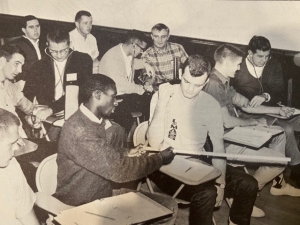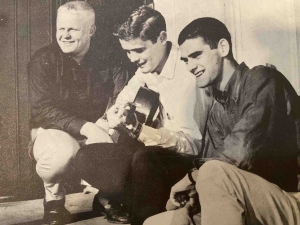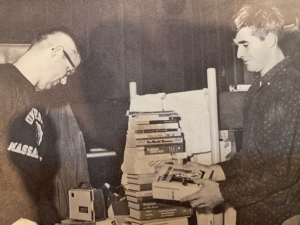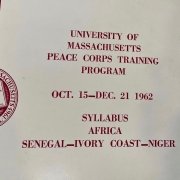Russy and Anita- As Young As The Peace Corps
This is part of a series of articles on the experiences of RVM residents in the Peace Corps. Also in this issue is the article on Jean and John Herron; the November issue featured Joni Johnson and Asifa Kanji and David Drury. Stay tuned…
by Joni Johnson
Russy and Anita Sumariwalla were trainers in the Peace Corps almost at its inception. They were both students (close, but not married) at the University of Massachusetts in Amherst when Russy was tapped as the Assistant Training Project Director for the first group of volunteers to go to Senegal, the Ivory Coast and Niger. This was in the Fall of 1962. President John Kennedy started The Peace Corps in 1961 as a project to promote world peace and friendly international relations. The first trainees went to Africa and South America in the summer of that year. Russy and Anita were right on the cutting edge of the Peace Corps, providing training for their groups just one year later.
At the time, Russy was working on a project for John Ryan, the Secretary of the University, while doing post graduate study. Russy had come from Bombay (now called Mumbai) and had only been in the country since 1959, first getting his Master of Laws degree in Charlottesville, Virginia, and then moving to the University of Massachusetts for study in International Law and International Organization. Ryan admired his work and thought that his multicultural background would help him in running the nuts and bolts of a training program which took volunteers from everywhere in the United States with plans to send them to three French speaking African countries. Anita had arrived in the United States by boat from Rotterdam in 1961. Having been born in the French speaking region of Switzerland, Anita was a perfect addition to the team of eleven French teachers for these 60 students. The goal was to get the new volunteers, ranging in age from 18 to 64, ready to take part in a two-year program to help and support the citizens of these African countries, largely in rural areas.
Almost none of the students spoke French when they arrived on campus. Anita and her fellow teachers needed to get these students able to speak passable French so they could carry out their lives in their new environments. So Anita not only taught these students during their 7am to 10pm daily schedules of classes and activities, but she ate meals with them as well. The Peace Corps had provided materials for teaching French, which they used in class. Meals and outside activities were a time to help them develop their vocabulary and conversational and reading skills in their new language.

Those fifteen hour days might include Physical Conditioning, Breakfast, and then classes in French, and, depending on their country, Food and Nutrition, Water and Waste, Goats, Irrigation, and Farm Machinery. Then more French, Lunch, American Studies and World Affairs, American Culture, Art, Music, The American Character, Rural Community Development, Mental Health, First Aid, Dinner, and more French.
Russy, as the Assistant director of the program, was charged with making everything run smoothly from housing to dining to problems between students. By the second week of fifteen hour days, students were generally exhausted, and that was the time that issues arose. Typically, many of the problems were with people who, from all over the country, from all ages and all walks of life and all types of American accents, were learning to get along with one another while experiencing exhaustion and anxiety as well as excitement. Both Russy and Anita emphasized that listening was probably one of the most useful tools of the trade in working with the volunteers as these problems arose. And of course, as the volunteers solved these problems with each other, they learned skills that would benefit them in the long run as they worked with their African colleagues.
Not only did the volunteers need to learn French, but they all had to become knowledgeable in the fields in which they were expected to support their African brethren. These areas included health, childcare, dealing with the sick, new skills to avoid Typhoid and Malaria (by boiling water, etc.) and help in the area of agriculture.

All the volunteers were idealistic and wanted to change the world. They all had a sense of adventure. But part of training was also to help them prepare for the disappointments that lay in store, like the possible non-existence of hot showers, or their programs being held up by lack of materials or promised materials not arriving for weeks. So that meant that training needed to include providing volunteers with the idea of never giving up and ways to maintain their spirits. One of the big adventures for the volunteers was a trip to the United Nations in New York for a reception, as invited guests of the Ambassador of Niger. This trip helped the volunteers form a deep connection to the Peace Corps and its goals.

I asked them both Anita and Russy what they would want their readers to know about their experience. Anita expressed her admiration for the volunteers: “They were so eager and courageous. Many of them had little idea of the country they were assigned to. Good training was such a vital part of their future success. I told them that they were ambassadors. Whatever they did or said would reflect on the U.S. Also, we cautioned them to respect the culture of their hosts even if they did not understand them. Seeing the generosity of the American spirit may have even influenced me to become an American citizen.”
Russy said that he was very impressed by our country’s enlightened approach to spreading our sense of freedom to developing countries. He admired all of the volunteers for wanting to make a better world and in a sense sacrificing two years of their lives to do this. He says, “I found myself lucky to have had that experience. It broadened my outlook. I had always felt that I was a citizen of the world, but this took it out of the abstract and made it a reality. I saw respect, love, care, tolerance and dignity for others.”
Russy’s and Anita’s experiences in the Peace Corps as trainers mirrored in many ways the experiences of the volunteers. It was a life changing and life affirming event.




Thanks, as always for the energetic journalism, Joni. I had no idea the Russy and Anita were involved so early in the history of PC; veritable Founding Mothers and Fathers they were!